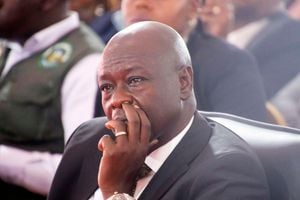African media should jealously guard the continent’s narrative

Journalists' cameras.
The past two weeks have seen orchestrated negative stories on Rwanda in major Western media.
Coordinated by Forbidden Stories, they are part of a dossier of so-called investigative reports on Rwanda put together by 50 journalists from 11 countries and carried by 17 media outlets.
The title - Rwanda Classified: Investigating Kagame’s repressive region – raises expectations of a bombshell of damning fresh revelations. Instead, it dredges out old, debunked accusations.
Rather than being an expose of alleged atrocities, it is an open attack on President Paul Kagame and the government of Rwanda. Which is why some have called them a media blitz on Rwanda, and others, media terrorism.
Rwandans responded to them with a barrage of denunciation of their own in social media, traditional press and on radio and TV talk shows. In addition to revealing the lies, inconsistencies, insincerity, and compromised journalistic standards and investigative ethics, they took issue with this being an outsiders’ job and their unstated aim: deciding and driving the narrative about Africa.
African journalists
Why is it that it is Western journalists and their media houses that decided to “investigate” an
African country that by any measure is doing well? Is it because African journalists are not up to it and somebody must do it for them or are complicit in the repression? That surely is condescending.
The originators and authors of the Rwanda Classified anticipated such a strong reaction. But they had not reckoned with its intensity. Rwandan media warriors can be unrelenting in defence of their country when under attack.
They also expected support from within the country and among its detractors outside. Whatever backing they got was muted or absent altogether. It has been a shock to them. It should not, though, because Rwanda’s story is well known. It is difficult to lie about it.
You might dismiss this as the expected reaction of regime supporters. Even assuming it may be so, what would you say about the shocked silence from those expected to agree with them? In addition, the rebuttal of their claims, point by point?
Swift response also came from a quarter they did not expect and one difficult to write off as Kagame’s praise singers. Thirty-two eminent historians and scholars, writers and journalists from across the world signed a rebuttal of Rwanda Classified and dismissed it.
These writers and scholars, whose collective knowledge of the recent history of Rwanda and the wider region few can rival, have examined the stories in Rwanda Classified and found fault with nearly everything about them.
First, they question the independence of the so-called investigation, The journalists were mobilised for this project and given an assignment. They were funded by whoever assigned them the job. Anyone with knowledge of the history and politics of this region would probably know who the sponsor is.
Then take issue with the objectivity of the analysis and credibility of the sources. The analysis was made to fit the agenda of the sponsor. Consultants and collaborators, and major sources in the Rwanda Classified stories can hardly be said to be disinterested witnesses or investigators.
Some belong to a category they call hate preachers, conspiracy theorists, and notorious deniers of the genocide against the Tutsi but presented in the stories as voices critical of Kagame.
Forbidden Stories
One is Michela Wrong, a British journalist and author close to Rwandan exiles, most of them fugitives from justice, for whom she has become a spokesperson. She has made a name as a leading Kagame hater. She seems to have been drafted into the Forbidden Stories narrative because of her revisionist credentials regarding the genocide against the Tutsi. Her writings on Rwanda offer an alternative narrative to the real history.
In Rwanda Classified, Forbidden Stories has an agenda: to throw mud at the government of Rwanda, deny or discredit its achievements and call for its removal. The scholars call it “enemysation” of Rwanda, which, according to them has since 1994 been “fuelled by networks nostalgic for Belgian and French control of Rwanda, and by the extremist diaspora resulting from the crushing of Hutu Power by the RPF in 1994.”
It goes beyond that to the audacity to defeat their man, the refusal of Rwanda to be a failed state but instead rise from the ashes, rebuild and reconcile and unite its citizens. The sin is for insisting on making its own choices about governance, economic development, and international relations.
It has refused to behave to type – not corrupt, uses aid effectively and its government is effective.
Now it is beginning to play a significant role beyond its borders.
This is what “enemyisation” is. It is the reward for doing right and can be bestowed on any African country doing what Rwanda has done.
Yet these are what should constitute the narrative of stories about African countries. Our journalists and scholars should be telling this and not allow outsiders to distort them.



